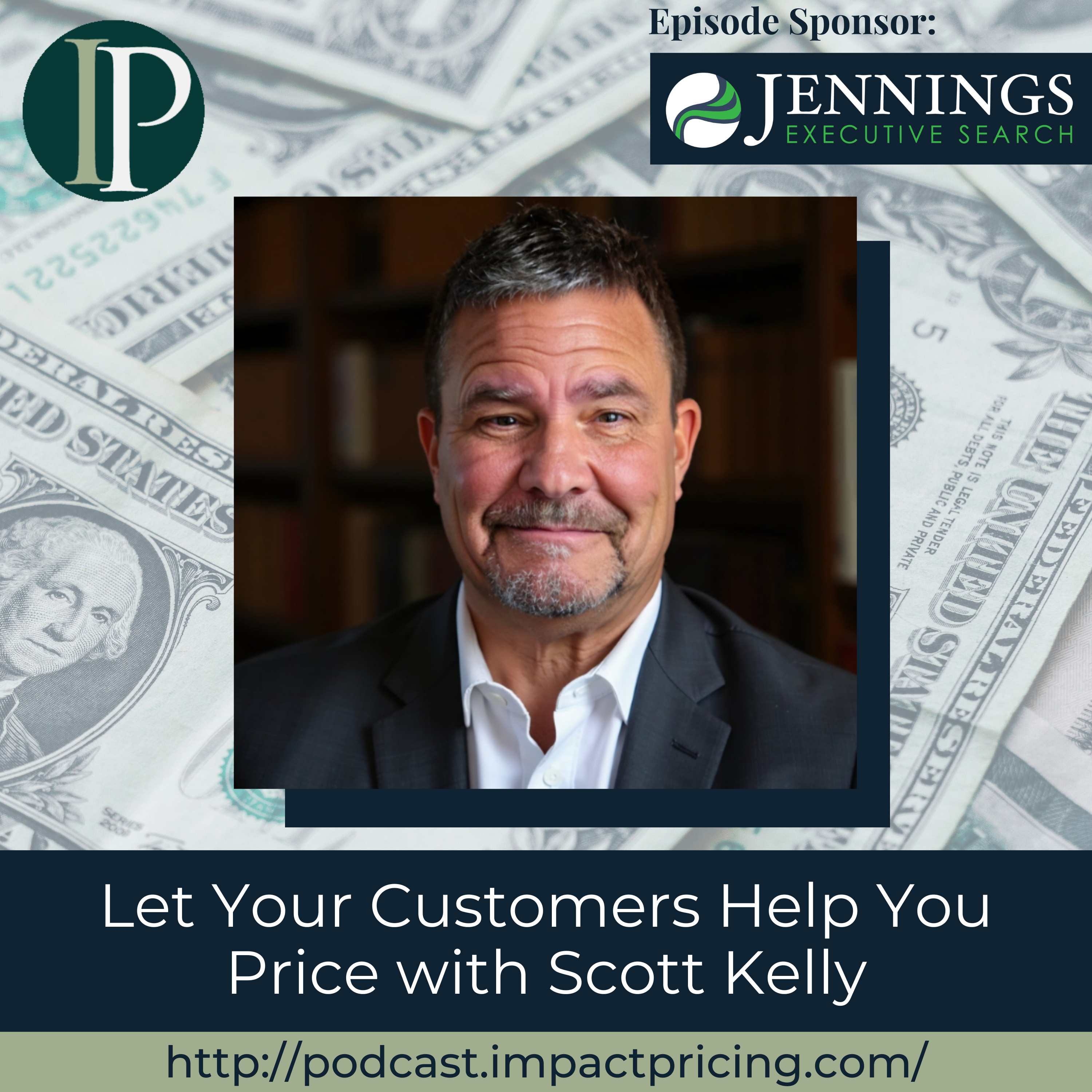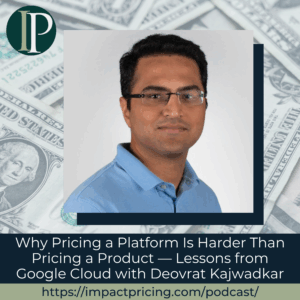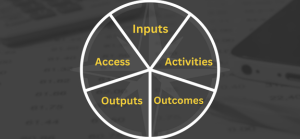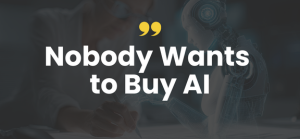
In this episode, Scott explains how important it is for entrepreneurs to listen to their customers when setting prices, as he shares his knowledge on maximizing profits through effective pricing strategies that investors love.
Podcast: Play in new window | Download
Why you have to check out today’s podcast:
- Learn how crucial recurring revenue models are to attracting investors and why subscription-based pricing provides the consistency they seek.
- Find out why selling on price alone is bad for both sides of the transaction and how to focus on value instead.
- Understand the power of letting your customers help you determine pricing through relationship-building rather than transactions.
“Let your customers help you price.”
– Scott Kelly
Topics Covered:
02:09 – How Scott accidentally discovered pricing through helping hundreds of entrepreneurs raise capital and maximize profits
02:52 – Why competing on lowest price destroys value for both buyer and seller – and what to do instead
04:30 – AI’s double impact on pricing: Using it for better decisions vs. pricing AI-enabled products
06:30 – How AI will democratize business like the internet did – and what that means for pricing
07:20 – The carpenter analogy: Why AI is just a tool and the real value comes from expertise in wielding it
08:18 – The art of determining “what the market will bear” through customer relationships and feedback
11:37 – Why Scott brings up pricing “almost immediately” with entrepreneurs (and why you should too)
13:04 – Finding the pricing “strike zone” – where customers won’t jump for joy but won’t run out the door
15:32 – The relationship vs. transaction mindset: How to get customers to help set your prices
17:14 – Scott’s final wisdom: Let your customers help you price – the ultimate customer-centric approach
Key Takeaways:
“At the end of the day, you want to provide enough value so they stick around at a price that can keep you sticking around.” – Scott Kelly
“AI is a tool. You need to make sure you have the right carpenter or the right instrument and the right professional playing that instrument. So I think how you price that is the value add that you bring to this tool that’s AI.” – Scott Kelly
“You have to spend time getting to know them. I think it’s a process of establishing a relationship versus a transaction.” – Scott Kelly
Resources and People Mentioned:
- VC Fast Pitch: https://vcfastpitch.com/
Connect with Scott Kelly:
- Website: https://blackdogventurepartners.com/
- LinkedIn: https://www.linkedin.com/in/blackdogceo/
Connect with Mark Stiving:
- LinkedIn: https://www.linkedin.com/in/stiving/
- Email: [email protected]
Full Interview Transcript
(Note: This transcript was created with an AI transcription service. Please forgive any transcription or grammatical errors. We probably sounded better in real life.)
Scott Kelly
Let your customers help you price.
[Intro / Ad]
Mark Stiving
Welcome to Impact Pricing, the podcast where we discuss pricing, value, and the sales-driven relationship between them. I’m Mark, and I run bootcamps to help companies get paid more.
Our guest today is Scott Kelly. Here are three things you want to know about Scott before we start:
He is the founder and CEO of Blackdog Venture Partners. He’s been doing that for 25 years. He’s the host of VC Fast Pitch and he has about a dozen companies with the name Blackdog in them. Welcome, Scott.
Scott Kelly
Thank you, Mark. Thanks for having me on.
Mark Stiving
Before I ask my first question, I have to ask: What’s Black Dog? I assume you had a black dog at one point in time, or do you still?
Scott Kelly
I did, and when I started the company actually in 2000, I was originally going to name it Zachary International after my newly born son, and it turned out there was a trademark issue.
So I was at the attorney, we were just going through names and I had a black lab named Mike and we landed on Black Dog. And I wish it was a more exciting story. I get, you know, the Led Zeppelin reference. I get all the other references, but that’s the story.
And honestly I’ve had four black dogs since then and I’ll probably get another black dog next.
Mark Stiving
So, well now they have to be black.
Scott Kelly
They do. Absolutely.
Mark Stiving
Right. How did you get into pricing, by the way? I know you’re not really a pricing guy, but let’s pretend like you are.
Scott Kelly
Sure. Well, pricing is so important. I work with literally hundreds of entrepreneurs at a time and thousands over my career. And you know, my primary role has been to help them raise capital.
When they’re talking to investors, the investors want to know how they’re going to maximize profits and how you maximize profits is maximizing the price for your product and service. It’s one of those tools and I have found, you know, like yourself many times, that everyone assumes that the lowest price is the best opportunity.
But selling on pricing is a bad thing for both sides of the transaction.
Mark Stiving
I have to say that I almost never work with companies who want to be the lowest price. It just makes no sense.
Scott Kelly
Well, the reality is you’re not going to provide the level of service because you need to maximize profit, and that’s the thing.
At the end of the day, you want to provide enough value so they stick around at a price that can keep you sticking around.
Mark Stiving:
Yeah. So you’ve seen hundreds, thousands of different companies. What pricing models get investors excited?
Scott Kelly:
Investors really like what’s called recurring revenue. Many years ago, you would go to a computer store and buy software, and then the whole concept of subscription and recurring revenue became the norm.
And that’s really what a lot of investors are looking at. They want consistent quantifiable revenue because that’s how they can mitigate their risk. So again, the best pricing model that we use primarily for SaaS companies and other member-based companies is a subscription-based pricing model.
Mark Stiving
Yeah, that makes all the sense in the world.
Do you differentiate? I often say the words recurring and reoccurring, meaning two different things. So recurring is usually a SaaS model, and [00:04:00] reoccurring is when I tend to sell the same thing over and over again to a set of customers. So Uber would be reoccurring. And LinkedIn, if I was paying LinkedIn would be recurring.
Scott Kelly
Well, I would tell you on Uber, I’m an Uber One member, so they’re also getting recurring revenue from me on the membership.
Mark Stiving
Yeah, they are. There’s no doubt. So what are you seeing in the world of AI today? Are most of your SaaS companies playing AI, and how are they doing pricing models for that?
Scott Kelly
Well, they actually have to. The reality is we’re still, although AI has been around for a while, it’s only been famous for a short while. It’s not going anywhere for a long while.
And I think the idea is that with SaaS companies, they’ve got to try to find more efficient ways to price their… how to get their products to market.
And so, from that standpoint, AI really has the ability to replace a lot of the folks they would normally hire. So from the production side, it’s definitely affecting the pricing to get their product and software out to market.
But on the reverse, you know, AI is playing into the price that they pay for marketing. The price they pay to generate content, to build branding, really every aspect of their business is going to be impacted, like more or less every business going forward.
Mark Stiving
Yeah, so often, the way I think about AI is, I think of it in two different sides of the coin today. This is just from my perspective, right?
I’ve got: How do I use AI while I’m doing pricing? And the other is: How do I price products that have AI in them? And it’s two very different thought processes. So AI is disrupting a ton of things.
Scott Kelly
It is. The reality is you could use AI to get better data, honestly. You can use AI to determine, you know, what the market penetration is at certain price points.
A lot of the market research going into pricing a product can be implemented through AI and many companies are already doing that.
Mark Stiving
Yeah, so it’s actually funny because when you go to the big pricing companies, the big pricing software companies, they’re absolutely using AI. They’re pulling in tons of data and they’re predicting what someone’s willing to pay and that’s phenomenal.
But I think most of my clients, most of the people I work with are smaller, mid-size businesses. They don’t have all this data. They can’t use AI for the data crunching and predicting of pricing, but we can use it to do research. Right. How do buyers make decisions? What’s important to buyers? Where’s the value to what we’re selling?
I do it that way all the time.
Scott Kelly
Yeah, absolutely. You know, the reality is to some of these smaller businesses, when you know, they can determine very quickly using AI when they’re doing meta ads, you know how to price their offering and they can find in real time what kind of click through rates they’re getting and be able to adjust accordingly.
So yeah, they don’t necessarily yet have direct access to data that’s going to change over time. I think much like the internet several decades ago, AI is going to democratize some aspects of running a business.
Mark Stiving:
Yeah. So, I want to jump back to the other half of pricing of AI, because that’s the side that I focus on way more.
And that is, how do I price products that have AI in them? Now I certainly have opinions, and I’ll toss them out to you, but just let me give you the softball first. What are your thoughts in that world?
Scott Kelly
Well, in that world, I think this is where the pricing versus value comes in. I think AI is a tool.
You need to make sure you have the right carpenter or the right instrument and the right professional playing that instrument. So I think how you price that is the value add that you bring to this tool that’s AI.
Mark Stiving
I think that’s a phenomenal example metaphor for this. Too many people think using the words AI is value and it’s really not. It is just a tool.
Scott Kelly
Absolutely. Absolutely. The reality is there’s a lot of tools out there, and a lot of people can use them for good and use them poorly, and that’s really where value comes in versus pricing.
Mark Stiving
Yeah. How do you think of value when you’re working with your clients, your potential companies, I guess I’ll say? How do you help them determine what is value? How much is someone willing to pay for their product?
Scott Kelly
The short answer is whatever the market will bear. But obviously that’s not really true. Going forward, I think a lot of it comes down to the other things that you get besides a simple product or simple software.
You can hire, you can go offshore, hire someone to do some great design work or some great coding, but are they available all the time? What if they don’t get the support that you need? I think it’s those value adds that really allow you to have a little more elasticity when it comes to your pricing.
Mark Stiving
Yeah, so I’ll certainly agree that differentiation is key, right? Differentiation is what makes, what allows us to charge a higher price than our competitors do, but if you’re working with a new entrepreneur or an owner, how do you convince them, “Hey, you need to go raise prices,” or, “Hey, you need to pick a new market segment where there’s a higher willingness to pay in this segment than most of the customers you’re dealing with”?
Scott Kelly
Well, a lot of the entrepreneurs we’re obviously helping them to maximize profit for the sake of the business, but we’re also encouraging them to increase margins and profits for the sake of investors, because investors are going to look at those metrics. They’re going to look at your profits, your margin, your cost of client acquisition, all of those things.
So I tell entrepreneurs, especially if you’re raising money, you’ve got to be sensitive to making sure you’re generating enough margin and add enough volume to be an effective investment. And then from a business standpoint, it’s you just have to be cognizant of what the market is and listen to your customer.
That’s really what it comes down to. I think a lot of times a lot of entrepreneurs will just come out with what they think is the best pricing for their product and don’t listen to their customers, and I think there’s a lot of opportunities before you make the sale and post-sale to get that feedback and adjust accordingly.
Mark Stiving:
Yeah, I think what happens, I’m totally with you, that they don’t listen to their customers, but I think what happens is you don’t really have the ability to come up with a perfect price. In fact, you can never have a perfect price. It just doesn’t exist. You can’t find it, but they find something that works and then they just stick with it.
Whereas in truth, there are people out there that just love what you do. And they would pay you a lot more if you could find them and figure out how to message to them and segment them away from the rest of the market segment.
Scott Kelly
I agree a hundred percent. You know, my business, obviously we work with a lot of accelerators and investors and entrepreneurs, but even my own business, we have a whole model surrounding putting the right resources in front of entrepreneurs.
And it’s like anything else they’re [00:11:00] going to buy from somebody else if you don’t present the opportunity to them. And so in my newsletter, we create partnerships with other services and service providers and get special pricing that would be of interest to the entrepreneurs.
And in that way, I’ve been able to take a single product or single service customer and turn them into a multiple, you know, service or product customer. And that obviously increases revenue, but it also increases the life of the client.
Mark Stiving
Yeah. So when do you bring up pricing with an entrepreneur you’re coaching or a new company that you’re coaching?
Scott Kelly
I bring it up almost immediately because the reality is it really sets the tone and I don’t shy away from it, and I tell everybody, if you feel that you’re worth that value, don’t shy away from that.
So many times if I’ll get an inbound inquiry, I will tell them exactly what it’s going to cost. And this is what I’m going to do. And I keep it very simple. I say, if you would like to follow up and learn more how I can justify that cost, let me know.
So I’m from New York, I’m a bit of an A-type personality and I’ve been in sales and trained thousands of salespeople. So I don’t shy away from that.
Mark Stiving
Yeah. I guess what I actually meant though was when you’re in the middle of coaching an entrepreneur, when do you tell them, “Hey, let’s talk about price. Hey, let’s figure out pricing.”
Scott Kelly
For their product? Yeah. It’s fairly early. I think they need to know as soon as possible what their top line is going to be so they can begin to determine their bottom line.
So it’s very early in the process, so they’ve got to research their competitors. They have to decide where they’re going to be on the spectrum. Pricing versus value and make a decision on that because again, you have to work those numbers at the same time you’re working on the expense line. Determine what kind of profit, what kind of market you have.
So it’s pretty early in the process.
Mark Stiving
Yeah. So what kind of pricing mistakes do you see entrepreneurs making?
Scott Kelly
I think probably the two primary mistakes is pricing too low, pricing too high. But that’s the simple answer. But I think more importantly is not getting enough data and not listening to their customers before they determine pricing.
We’ve come across many opportunities where someone did not have the ability to pay for a product, but if you could find a solution to pay for that product, maybe you offer in-house financing or have a financing partner. Maybe you offer terms, maybe you carry the cost yourself.
But I think that the main thing is not really understanding what the… not being in the strike zone, at least.
Like you said, you’re not going to be perfect. Your price isn’t going to be for everybody, but you should at least do enough empirical research and listen to your customers enough to know a price that won’t make them jump for joy, but won’t make them run out the door. [00:14:00]
Mark Stiving
Right, right. So I have to say that when you said pricing too high or pricing too low, here’s what came into my mind.
I never see companies that price too high. Now that could be because they die quickly, I don’t know. But I see tons of companies that price too low. Right. Almost every company. Right. And especially if you’re thinking a solopreneur, they’re putting a number on themselves and their self-confidence just isn’t where it needs to be to be able to say, “Yeah, I’m worth this price.”
I find that a lot.
Scott Kelly
I think part of that’s elasticity. You have to realize that you could charge too much and just lose clients and lose opportunities. Again, I don’t recommend a lot of discounting. Obviously I don’t do a lot of promotional things.
I tell people I’ve been doing this for 30 years and you know, I raised $5 billion. I’ve taken three of my own companies public. I think I have enough skill, experience and background to [00:15:00] justify it, and I think even for a new entrepreneur, when I was a 22-year-old retail stock broker fresh out of college, what I couldn’t sell in experience, I sold in enthusiasm.
Mark Stiving
Yeah, pretty fascinating.
So one of the things you’ve said, I don’t know, 3, 4, 5 times since we’ve been talking is listen to your customers. That’s paramount. I dearly love that, dearly love that concept. How do you teach people to do that? You can’t just say, go listen to your customers, because people can’t listen.
Scott Kelly
I think it comes down to establishing a customer as a relationship, not a transaction.
You have to spend time getting to know them. I was fortunate very early in my career to learn how to establish rapport, learn other things about my customers and my clients. So I think it’s a process of establishing a relationship versus a transaction, but I think also it’s important to continually experiment.
Experiment with a pricing model. Go from, you see it all the time. There’s an opportunity to buy something on a monthly basis. Test it out if they want to pay on a yearly basis and what that discount might look like, if they want a premium service, if they want more time, if there’s an add-on that you can provide and simply ask, “What can I do better?”
Or “What else do you need?”
Mark Stiving
Yeah. Yeah. So I would say that listening part is really important. So here’s the hint that I always give people, and you can tell me if you like this or not. I think that we serve our customers by solving their problems. And so what we always have to do is be thinking what problems do you have and what results are you hoping for?
When I can solve those, or when they get solved, and I think if we can focus entrepreneurs or business people on problems and results, then everything else just happens.
Scott Kelly
It’s interesting you say that because our unadvertised motto is that we solve problems and create opportunities. So absolutely. I agree with that.
Mark Stiving
Yeah, absolutely. So, excellent. Hey Scott, this is fun, but I’m going to start to wrap this up. Can I ask you the final question? What is one piece of pricing advice you would give our listeners that you think could have a big impact on their business?
Scott Kelly
Let your customers help you price.
Mark Stiving
Nice, nice. Scott, thank you so much for your time today. If anybody wants to contact you, how can they do that?
Scott Kelly
They can reach me at LinkedIn, on my website blackdogventurepartners.com, or they can email me at [email protected].
Mark Stiving
Perfect. To our listeners, thank you for your time. If you enjoyed this, would you please leave us a rating and a review? And finally, if you have any questions or comments about the podcast or if your company wants to get paid more for the value you deliver, email me, [email protected]. Now go make an impact.
[Ad / Outro]
















